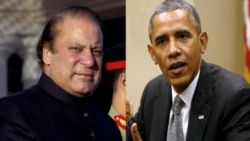WASHINGTON —
Pakistan’s Prime Minister Nawaz Sharif meets U.S. President Barack Obama at the White House Wednesday. It will be the first meeting between the two men. The Pakistani leader is expected to highlight issues that have caused friction between Washington and Islamabad in recent years.
The meeting between Obama and Sharif comes amid U.S. preparations for the withdrawal of combat troops from neighboring Afghanistan. The U.S. expects Pakistan to play a constructive role, says Karl Inderfurth, an analyst at the Center for Strategic and International Studies in Washington.
"Pakistan has good contacts in Afghanistan and it could use them for good purposes," he said. "The U.S. and Pakistan working together gives a greater hope for some positive outcome in Afghanistan than if we were working at cross purposes."
U.S. drone strikes inside Pakistan are extremely unpopular in the country. Sharif wants them stopped. But U.S. officials consider them a helpful tool in taking out al-Qaida-backed militants. Sharif’s White House meeting will be the first opportunity to directly raise the issue with Obama, says analyst Daniel Markey of the Council on Foreign Relations.
"I think there is an opening there. Even though this White House has used drones more than any other, I think the number of targets at the top of their list has dwindled," he said. "So, there is less reason to use them. And I think the recognition of the political cost is there."
Pakistan’s commitment to go after terrorists from Pakistan who allegedly launch attacks on Afghan-based U.S. and NATO troops will be at the top of the agenda as well, says Markey.
"I think the United States would like to have from Nawaz Sharif a better understanding of what he is willing to do in terms of cooperate on counter terrorism moving forward," he said. "Washington wants to have itself on more stable footing so that it can make plans for the years ahead."
Getting U.S. aid for Pakistan’s energy and economic crisis may also be on the agenda, says analyst Inderfurth.
"In his meeting with President Obama, they could talk about the things that Pakistan needs to get its economy up and running and power generation that needs to do that," he said. "So I hope there will be a broader agenda that is beyond security, drones and Afghanistan."
During his four-day visit to Washington, Sharif has met with U.S. Secretary of State John Kerry. And he has scheduled time with several members of the U.S. Congress before his meeting with Obama at the White House.
The meeting between Obama and Sharif comes amid U.S. preparations for the withdrawal of combat troops from neighboring Afghanistan. The U.S. expects Pakistan to play a constructive role, says Karl Inderfurth, an analyst at the Center for Strategic and International Studies in Washington.
"Pakistan has good contacts in Afghanistan and it could use them for good purposes," he said. "The U.S. and Pakistan working together gives a greater hope for some positive outcome in Afghanistan than if we were working at cross purposes."
U.S. drone strikes inside Pakistan are extremely unpopular in the country. Sharif wants them stopped. But U.S. officials consider them a helpful tool in taking out al-Qaida-backed militants. Sharif’s White House meeting will be the first opportunity to directly raise the issue with Obama, says analyst Daniel Markey of the Council on Foreign Relations.
"I think there is an opening there. Even though this White House has used drones more than any other, I think the number of targets at the top of their list has dwindled," he said. "So, there is less reason to use them. And I think the recognition of the political cost is there."
Pakistan’s commitment to go after terrorists from Pakistan who allegedly launch attacks on Afghan-based U.S. and NATO troops will be at the top of the agenda as well, says Markey.
"I think the United States would like to have from Nawaz Sharif a better understanding of what he is willing to do in terms of cooperate on counter terrorism moving forward," he said. "Washington wants to have itself on more stable footing so that it can make plans for the years ahead."
Getting U.S. aid for Pakistan’s energy and economic crisis may also be on the agenda, says analyst Inderfurth.
"In his meeting with President Obama, they could talk about the things that Pakistan needs to get its economy up and running and power generation that needs to do that," he said. "So I hope there will be a broader agenda that is beyond security, drones and Afghanistan."
During his four-day visit to Washington, Sharif has met with U.S. Secretary of State John Kerry. And he has scheduled time with several members of the U.S. Congress before his meeting with Obama at the White House.





